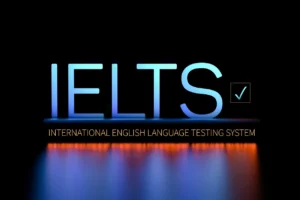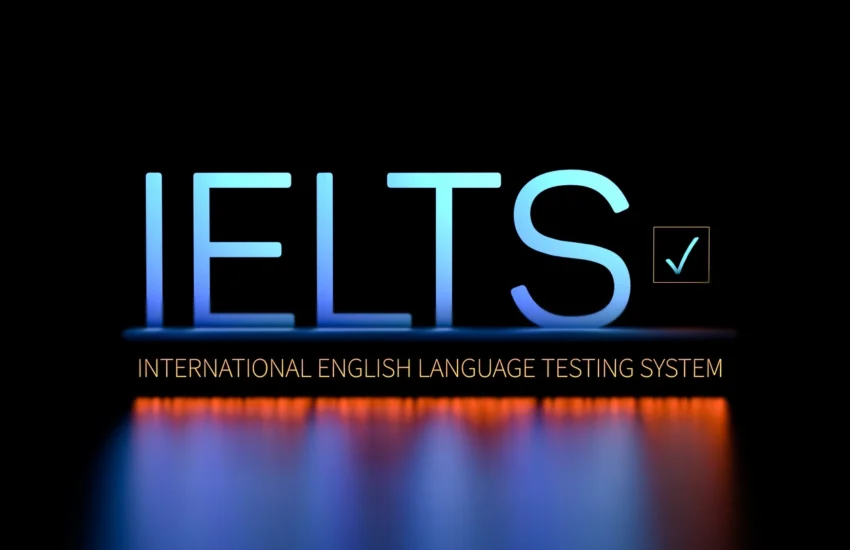One of the most well-known names while getting ready for an English proficiency exam is IELTS. What does the IELTS full form represent, though? International English Language Testing System is the IELTS full form. This is a standardized test of English language competency intended for people who do not speak the language natively.
In English-speaking nations, it is extensively recognized by academic institutions, businesses, and immigration agencies, making it an essential component of the application process for anyone looking to study, work, or immigrate overseas. Anybody preparing to take the test must comprehend the IELTS full form and its importance.

1. Being aware of the purpose of the IELTS Full Form
The International English Language Testing System, or IELTS Full Form, emphasizes that its main purpose is to serve as a worldwide benchmark for evaluating English language competency. The four main language skills that are assessed in the test are speaking, writing, reading, and listening. The IELTS exam has several sections that concentrate on various facets of language usage, guaranteeing that applicants possess a comprehensive command of the English language.
It is impossible to exaggerate how important the IELTS Full Form is, particularly for students hoping to enroll in universities where English is the primary language of instruction. IELTS scores are required by several universities in the UK, Canada, Australia, and New Zealand as part of the admissions procedure. Employers in English-speaking nations also frequently consider IELTS scores when selecting foreign applicants. IELTS results are also used by immigration authorities to assess applicants’ language skills, which is essential for obtaining visas.
Read Also: Best Art Schools In Canada
2. The IELTS Exam’s Structure
Everyone preparing to take the IELTS exam needs to be aware of its structure. IELTS Academic and IELTS General Training are the two primary test kinds included in the IELTS Full Form. The same four language skills are evaluated in both versions, but their goals are different.
IELTS Academic: Those who want to pursue postsecondary education or professional registration in an English-speaking setting should take this version of the exam. The Academic test concentrates on linguistic proficiency related to academic contexts, like comprehension of intricate texts and composition of well-organized essays.
IELTS General Training: Those who intend to relocate to an English-speaking nation for employment or educational purposes are the target audience for this version. The General Training exam assesses common language proficiency required in social and professional contexts.
Both IELTS test variants are accepted worldwide and use the same IELTS Full Form. The candidate’s objectives will choose whether to choose Academic or General Training.
3. IELTS Band Descriptors and Scoring
The IELTS Full Form includes both the exam and the band scores, a scoring system with a range of 0 to 9. Every band score represents a certain degree of English proficiency:
- Band 9: Skilled operator
- Band 8: Excellent user
- Band 7: Reliable user
- Band 6: Skilled operator
- Band 5: Quiet operator
- Band 4: Constrained user
- Band 3: Very restricted user
- Band 2: Sporadic user
- Band 1: Not a user
- Band 0: Did not try to pass the exam
The individual band scores for the hearing, reading, writing, and speaking portions of the IELTS exam are averaged to create the overall band score. For candidates hoping to fulfill particular requirements established by colleges, businesses, or immigration authorities, it is essential to comprehend the score system and what each band means.
Read Also: Top Community Colleges in Canada for International Students
4. The Value of IELTS in the Education of Global Students
For students studying abroad, the IELTS Full Form is a sign of academic achievement. The majority of colleges in English-speaking nations demand evidence of English language competency as a condition of admission. One of the most recognized ways to demonstrate this is through the IELTS test. A strong IELTS score might lead to scholarship possibilities and admission to esteemed universities.
Additionally, the IELTS exam gets pupils ready for the language barriers they’ll encounter in an academic setting where most people speak English. The test’s emphasis on academic language proficiency, especially in the Academic version, guarantees that students are prepared to comprehend lectures, participate in discussions, and successfully finish assignments.
5. IELTS Exam Preparation Tips
Getting a desired band score on the IELTS requires preparation. Considering the importance of the IELTS Full Form, careful planning is necessary. The following advice can help you prepare effectively:
- Acquaint Yourself with the Test Format: You can feel less nervous on test day if you know how the test is organized, what kinds of questions are asked, and how long each part will take.
- Practice Often: It’s important to practice all four language skills—speaking, reading, writing, and listening—on a regular basis. Make use of online resources, practice exams, and IELTS preparation tools.
- Expand Your Vocabulary: The reading and writing portions require a solid vocabulary in order to be successful. Make it a habit to learn new words and to read a lot of English literature.
- Take Mock Exams: Timed practice exams can help you mimic the testing setting. This will assist you in efficiently allocating your time throughout the exam.
- Seek Feedback: If at all feasible, collaborate with a mentor or teacher who can offer you feedback on your speaking and writing abilities. Positive feedback can assist you in determining your areas of weakness.
6. Often Held Myths Regarding the IELTS Test
Misconceptions regarding the IELTS examination can cause needless anxiety. Candidates can take the test with confidence if they understand the IELTS Full Form and dispel these myths.
- Myth 1: There’s No Need for Preparation for Native English Speakers It is beneficial for even native speakers to become acquainted with the test format and practice the particular skills that the IELTS exam evaluates.
- Myth 2: You Can’t Get a Better Band Score: You can raise your band score with consistent practice and smart study techniques. A lot of applicants receive higher marks after trying twice or three times.
- Myth 3: Some Countries Make the IELTS Test Easier: Because the IELTS exam is standardized, the level of difficulty doesn’t change depending on where it is administered. The universal application of the IELTS Full Form guarantees equity for every applicant.
7. IELTS’s Worldwide Recognition
Global recognition is one of the reasons the IELTS Full Form is so well-known. IELTS scores are accepted by over 10,000 organizations in more than 140 countries, making it one of the most reliable English language tests available. Educational institutions, businesses, professional associations, and immigration agencies are all recognized.
This means that for students, getting into a university around the world may depend on their IELTS score. It can lead to career chances for professionals in English-speaking nations. It might also be an essential step for immigrants in order to get a visa.
8. Alternative Exams for the English Language
There are several English language tests accessible, despite the fact that the IELTS Full Form is the most commonly recognized. Similar objectives are also served by other exams such as the Cambridge English, PTE Academic, and TOEFL. Nonetheless, IELTS continues to be a well-liked option because of its thorough evaluation of language proficiency and acceptance by a large number of employers.
The ideal test format, the candidate’s strengths and shortcomings, and the particular requirements of the institution or organization all play a role in selecting the appropriate exam.
Read Also: Association of Universities and Colleges of Canada
9. IELTS’s Prospects
With English remaining the primary language of communication worldwide, the IELTS Full Form will only become more significant. To better meet user expectations, the test has already undergone multiple revisions. More digital and flexible testing options could be added in the future.
As of right now, anyone wishing to prove their fluency in English must still do the IELTS. Knowing how to complete the IELTS Full Form and being ready properly can make all the difference, whether you’re taking the test for academic, professional, or immigration objectives.
What exactly does the IELTS full form mean?
The International English Language Testing System is known as the IELTS full form. It denotes an internationally accepted English language competency exam intended to evaluate non-native English speakers’ language skills. The four sections of the IELTS exam are speaking, reading, writing, and listening. It is utilized for job, immigration, and academic purposes.
Why is it vital for professionals and students to take the IELTS full form?
Because it is a test that is widely recognized by colleges, companies, and immigration agencies in English-speaking nations, the IELTS full form is significant. Getting a good score on the IELTS test is frequently a requirement for getting into university courses, getting a work permit, or finding a job in an English-speaking setting. Recognizing the IELTS full form aids applicants in appreciating the significance of the test and planning appropriately.

How can being familiar with the IELTS full form aid with test preparation?
Understanding the IELTS full form aids candidates in comprehending the aim and range of the test. The test is extensive and includes many facets of English language competency, as indicated by its full name, the International English Language Testing System. Knowing this, applicants can concentrate their study on the listening, reading, writing, and speaking portions of the exam to guarantee strong performance in all areas.
Are all IELTS full forms the same in all countries?
Yes, the International English Language Testing System is the full form of the IELTS. The exam is standardised and given consistently throughout nations, guaranteeing that the outcomes are equivalent and acknowledged globally. The format and substance of the exam are the same regardless of where you take it, and the IELTS full form is the same.
How does the test’s worldwide recognition translate into the IELTS full form?
By stating that it is an international examination system, the IELTS full form indicates its widespread acceptance. The full form of the word “International” highlights how more than 10,000 organizations across more than 140 countries recognize and value the IELTS exam. This broad acknowledgment highlights how crucial the IELTS test is for anyone who want to live, work, or study in English-speaking nations.
Recommended
- Top Community Colleges in Canada for International Students
- Postdoctoral Fellowship in Canada for International Students
- Admission Requirements – Study in Canada
- MBA in Canada Without GMAT For International Student
Which test kinds are included in the IELTS full form?
There are two primary test types available under the IELTS full form: IELTS Academic and IELTS General Training. Applicants wishing to register as professionals or pursue further education in an English-speaking setting should use the Academic version. For those who are traveling to English-speaking nations for training programs, work experience, or secondary school, the General Training edition is appropriate. Although both test variants use the identical IELTS full form, their objectives vary based on the demands of the candidate.
SEE ALSO:
Trust you found our article on What is the IELTS Full Form helpful. Follow our website for more interesting articles.

